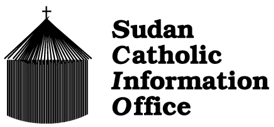Relief aid distribution method needs to be improved
A most effective way of combating the current famine in southern Sudan must involve a change in the method of distributing the famine relief, missionary sources have observed.
Speaking in the Kenyan capital, Nairobi, on arrival from a two-week stay in Sudan, the Apostolic Administrator of the Catholic Diocese of Rumbek, southern Sudan, Monsignor Caesar Mazzolari, noted that some problems in the relief distribution had greatly reduced the effectiveness of the current humanitarian efforts. "Besides some victims finding it hard to reach the distribution centres because of their age or state of health, there have been some instances of abuses by some people involved in the distribution", Monsignor Mazzolari said.
"A way must be found out of reaching the sick, the elderly and the children who can hardly walk to the distribution centres" said the Comboni clergy, adding that, "sometimes people walk long distances to the distribution points only to find all food finished. I witnessed dramatic cases of starving mothers with their children collapsing on an airstrip after walking all night and finding that the food distribution had ended."
He suggested increased airdrops to the most marginalised areas The UN-Operation Lifeline Sudan (OLS) has conceded that despite the ongoing massive humanitarian operation, the situation in Bahr el-Ghazal continues to deteriorate. A recent set of nutritional surveys conducted by UNICEF in 12 rebel-held locations, for instance, found that on average, 50.9 per cent of the children were malnourished.
The survey further revealed that whereas the OLS agencies are currently feeding approximately 14, 000 children in 19 feeding centres, upto 38, 000 were in need and could only be served effectively by increasing the feeding centres to 38. "More families have suffered a complete breakdown in their livelihoods and have no means of feeding themselves. Wild foods, on which people have been surviving for the last few months, have been almost used up and the rains, on which so much is depending, are late and erratic," says UNICEF deputy chief of operations Ted Chaiban. Monsignor Mazzolari said that earlier reports had grossly underestimated the number of people in need of urgent famine relief. "The Catholic Church alone fed 7,000 people per day in the month of June.''
Whereas earlier reports had put the number of those in need at 380,000 in the Bahr el-Ghazal region, it is now estimated that up 2.6 million people in southern Sudan are in need of emergency food aid. "Overall," said Mazzolari, "the World Food Programme has done a commendable job but the problem is far from over. At least 10, 000 metric tonnes will be needed per month in the next two to three months.''
Appealing for more support, he said that western governments in particular needed to get more actively involved in the Sudanese crisis. "The level of famine in Sudan has surpassed what the world had previously considered as the worst crisis," he said. The worst famine in Africa in the recent times was witnessed in Sudan's eastern neighbour Ethiopia in mid-1980s. The disaster, attributed to drought in the marginal Horn of Africa region, claimed at least a million lives.
On feelings that relief aid was not a lasting solution to the Sudanese crisis, Monsignor Mazzolari said: "Whereas relief aid is not a lasting solution, things must be done in stages and what is required now is relief aid, to save the many lives that are in great danger. We can then go to the next stage of supplying the people with seeds, farm tools fishing lines and fishing hooks to enable them produce their own food."
He further stated that the Catholic Church would not allow negative press reports and criticism, emanating from some people based in Europe, to distract it from doing all within its means, to assist the suffering Sudanese "The Church has a clear policy that governs all its activities and we shall always adhere to this in serving the people,'' he asserted.
Monsignor Mazzolari also appealed to the Sudanese government to stop bombing rebel-held areas in southern Sudan, as this was hampering the relief organisation and terrorising the people.
Besides prolonged drought, the current food crisis in Africa's most expansive nation has been blamed on the protracted civil war. The war, whose causes are deeply rooted in Sudan's colonial past, pits the Islamic and Arab north against the traditionalist and Christian southerners. Its current phase, which began in 1983, has so far claimed an estimated 1.3 million lives. Thousands have been forced into exile as refugees, while equally large numbers have been displaced internally.
Efforts to bring an end to the crisis through the regional Inter-Governmental Authority on Development (IGAD), have so far been unsuccessful.
Charles Omondi
----------------------------------------------------------------------
SUDAN CATHOLIC INFORMATION OFFICE
Bethany House, P. O. Box 21202, Nairobi, Kenya
tel. +254.2.562247 or 569130, fax 566668
e-mail: scio@maf.org
----------------------------------------------------------------------
For further information, please contact:
Fr. Kizito, SCIO, tel +254.2.562247 - fax +254.2.566668 - e-mail: 
